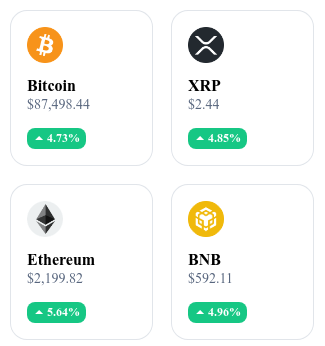📉 Trump triggers an economic war, BTC plunges !
Welcome to the Daily tribune of Wednesday, March 5, 2025 ☕️
Happy New Year to Cointribu! 🚀
Today, it is Wednesday, March 5, 2025 and like every day from Tuesday to Saturday, we summarize the news from the last 24 hours that you shouldn’t miss !
But first…
✍️ Cartoon of the day:
A quick look at the market…
🌡️ Temperature:
Sunny ☀️
24h crypto recap! ⏱
🚫 The IMF bans the accumulation of Bitcoin in El Salvador in exchange for a loan of 1.4 billion $ !
The International Monetary Fund (IMF) validated a loan of 1.4 billion $ to El Salvador, on the condition that the country drastically limits its exposure to Bitcoin. Among the imposed measures: companies will no longer be required to accept BTC, the State must reduce its Bitcoin holdings, and the national wallet Chivo will be sold or abandoned. This decision, although controversial, aims to reassure international investors, but it could hinder El Salvador's ambition to become a crypto hub. 🔗 Read the full article
🕵️♂️ Bybit hackers launder 1.4 billion $ in just 10 days !
The largest hack in crypto history continues to shock: in just 10 days, hackers have laundered 100% of the stolen funds. Thanks to THORChain, a decentralized protocol facilitating cross-chain exchanges without KYC control, they were able to erase their traces quickly. The Lazarus group, linked to North Korea, is identified as the main suspect, using these funds to finance Pyongyang's nuclear program. 🔗 Read the full article
🤝 Michael Saylor abandons his maximalism and supports Trump's multi-crypto plan !
The founder of Strategy (formerly MicroStrategy), Michael Saylor, known for his Bitcoin maximalism, surprises by supporting the crypto diversification of Trump's plan. In an interview on CNBC, he stated that the inclusion of XRP, Solana, and Cardano in the United States' national reserve was a $100 trillion opportunity. An unexpected turnaround, as he had previously criticized these altcoins. This change reflects a real evolution in American crypto policy, but it still divides the community, with some believing that only Bitcoin should be recognized as a strategic reserve. 🔗 Read the full article
🌎 Trump imposes new tariffs: the crypto market collapses !
Trump's new tariffs, including 25% on Canada and Mexico, and 20% on China, have triggered a crypto crash. In 24 hours, Bitcoin lost 10%, dropping to $83,700, and Ethereum fell by 15%, reaching $2,082. This major economic shock enhances the outflow of institutional investors, with $74 million in withdrawals from Bitcoin ETFs in a single day. If Trump continues down this path, trade reprisals could exacerbate the global economic crisis, and by extension, that of the crypto market. 🔗 Read the full article
The crypto of the day: Aave (AAVE)
Aave is a non-custodial decentralized finance (DeFi) protocol that allows users to participate as liquidity providers or borrowers. Providers deposit digital assets into liquidity pools to earn interest, while borrowers can access this liquidity by providing collateral exceeding the borrowed amount. Aave's major innovation lies in its decentralized and automated approach to lending and borrowing, eliminating the need for traditional intermediaries and providing enhanced transparency through the use of smart contracts on the Ethereum blockchain.
The native token of Aave, AAVE, primarily serves as a governance token, allowing holders to participate in decisions regarding the evolution of the protocol. AAVE holders can propose and vote on improvements to the protocol, thus directly influencing its future development. Moreover, by staking their tokens, users contribute to the security of the network and receive rewards in return.
Recent performances:
Current price: $215.44 (approximately €203.50)
24-hour change: +23.6 %
Market capitalization: $3.24 billion
Rank on CoinMarketCap: #31
Brazil accelerates de-dollarization within BRICS: Trump threatens to retaliate with punitive tariffs
The opposition between BRICS and the United States takes on a new dimension with Brazil's stated intention to reduce its dependence on the dollar. Under the leadership of President Luiz Inácio Lula da Silva, the country is engaged in a process of de-dollarization by developing BRICS Pay, an alternative payment system that allows member countries to escape the dominance of the SWIFT system controlled by Washington. More than 50 countries are reportedly ready to adopt this solution, which could shake the dollar's monopoly on international trade.
In a recent speech, Lula clarified his position:
"This is not about replacing our currencies, but we must work for the multipolar order we wish to be reflected in the international financial system."
Although the creation of a BRICS common currency is not yet on the agenda, Brazil, together with Russia, is accelerating the use of local currencies and digital currencies for certain international transactions.
Trump strikes back with the threat of massive tariffs
In response to the rising power of the BRICS, Donald Trump does not hide his hostility. He recently threatened to impose customs tariffs of 150% on imports from countries he considers responsible for an attempt to destabilize the dollar.
"Any BRICS state that mentions the destruction of the dollar will be sanctioned."
This threat marks an escalation in economic tensions between the United States and emerging countries. However, the BRICS do not seek to eliminate the dollar, but rather to develop alternatives to limit their dependence on Western financial institutions.
The question remains open:
Will Trump take action with massive trade sanctions?
Can Brazil avoid these reprisals by insisting on the absence of a common BRICS currency?
Towards a shift in the global monetary system?
If BRICS Pay manages to be adopted by more than 50 countries, it would represent a direct threat to the dollar's dominance. The BRICS summit in July 2025 will therefore be crucial to observe the evolution of this strategy.
On one side, the United States could try to crush this initiative through economic sanctions. On the other side, the BRICS are counting on a gradual transformation of the international financial system, where the dollar would no longer be the only global reference.
The future of this confrontation remains uncertain, but one thing is sure: the economic power dynamics between the major powers are in full flux.









